Evangelical
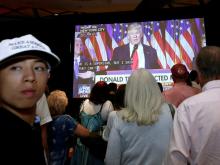
In the aftermath of this presidential election, I can’t help but see striking similarities between what happened inside the religious cult of my childhood and what played out for us, in the political cult of personality.
Here was the larger-than-life leader drawing followers to himself, despite the facts of his poor character, lack of experience, and even despite the fact that media, pundits, and pollsters claimed he wouldn’t — couldn’t — win.

Humanists went to federal court in Denver to prevent Colorado schoolchildren from being asked to put together Christmas gift boxes sponsored by an evangelical charity.
The hearing on Nov. 16 was the result of a suit filed by the American Humanist Association, a national organization of humanists, atheists, and freethinkers. They are representing three humanist families who say the constitution’s guarantee of the separation of church and state is violated when their suburban Denver school district asks their children to assemble Christmas gift boxes that include the “opportunity . . . to faithfully follow Jesus Christ.”
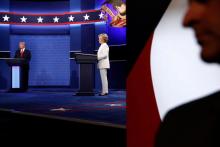
For some, the choice is not clear. Clinton-Kaine may be the more personally religious ticket, but Trump-Pence is more cozy with the religious right, aka the evil empire among atheists. Then there’s Green Party candidate Jill Stein, who has no chance of victory, but is the only candidate who reached out to nonbelievers and asked for their vote.
So what’s an atheist to do?

“I think it took a comment from Trump that personally affected a majority of evangelicals for there to be a tipping point,” said Katelyn Beaty, editor at large of Christianity Today, and author of A Woman’s Place: A Christian Vision for Your Calling in the Office, the Home, and the World.
“More than half of every church is women, and all those women are affected by comments about sexual assault.”

(RNS) Dozens of conservative evangelicals and Catholics have signed an open letter urging their progressive counterparts to “repent of their work that often advances a destructive liberal political agenda.”
The letter, posted online six weeks before Election Day by an alliance called the American Association of Evangelicals, includes criticism of Democratic presidential candidate Hillary Clinton.
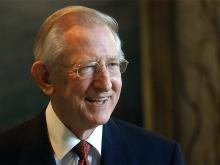
Butt was the former head of the H.E. Butt Foundation, which takes as its mission “the renewal of the Church” and runs retreat programs and a Christian camp for children.
He was perhaps best known, though, as the fatherly voice of one-minute radio spots, called “The High Calling of Our Daily Work,” in which he gently preached that people should make Christianity the cornerstone of their life’s work.

An interview with author Lisa Sharon Harper.

Harper’s account of the Gospel in her new book is shalom-based. Drawing deeply from a theme that runs through the Bible but is especially strong in the Hebrew prophets, Harper tells a story of a God who acts in Jesus Christ to bring shalom, or holistic peace and justice, in every part of creation.

Counseling a gay person to deny his same-sex attraction, to marry a woman, to raise children with her; and then to condemn him when he discovers years later what a futile plan that was — this is not the kingdom of God. What it is is the kingdom of a particular interpretation of the Bible, the kingdom of a theological system turned in on itself, of religious people who, like the older brother in Jesus' story of the Prodigal, refuse to believe that God could be so extravagant with grace.

A Gordon College philosophy professor is suing her employer for allegedly breaching her free speech rights and retaliating after she publicly criticized the Christian school for its policy of not hiring sexually active gays and lesbians.

In August 2014, a top-ranking official in the Chinese government informed the world that China was planning on nationalizing Christianity. Wang Zuoan, director of the State Administration for Religious Affairs, told a forum in Shanghai that the “construction of Chinese Christian theology should adapt to China’s condition and integrate with Chinese culture.” The announcement, unsurprisingly, triggered significant consternation among Christian groups in China and around the globe.

Russell Moore may be president of the Ethics & Religious Liberty Commission of the Southern Baptist Convention. But don’t call him an evangelical — at least not until the current election cycle ends.
Moore started introducing himself as a “gospel Christian” a few weeks ago. That’s because, he said, “The word ‘evangelical’ has become almost meaningless this year, and in many ways the word itself is at the moment subverting the gospel of Jesus Christ.”
1. Trayvon Martin Was Killed Four Years Ago Today
And here’s what’s happened since. Watch. Share.
2. How a Christian College Turned Against Its Gay Leader
“While Dr. Hawkins and I were scrutinized for different reasons, our stories have this in common: we urged Christians to stand with and for groups that sit at the center of political debates. And we did that as women, one black and one gay. I can only speculate about why Wheaton’s administration has been inconsistent in their treatment of different employees, but one thing is clear: fear makes public perception supremely important.”

Hawkins' act of solidarity with scapegoated people of Islamic faith — wearing a hijab on campus — and her Facebook statement that Christians and Muslims worship the same God struck a nerve within Wheaton College’s white, politically conservative administration. Ultimately, the public act of solidarity challenged the assumption of white, male, Christian supremacy — the assumption that whites, men, and Christians are more human than anyone else.

The run-up to the Feb. 1 Iowa caucus has shifted from who is toughest on ISIS or immigration or Obamacare to an all-out scramble to court evangelicals — an estimated 60 percent of Republican caucus likely voters. However, a new report from the Public Religion Research Institute shows that evangelicals may be sharing their November election clout with a different voting bloc. PRRI found about one in four Iowans identify as evangelical but a similar percentage say they have no religious identity, the nones.
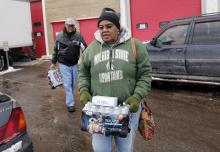
Catholic Charities is giving out water and food. The Flint Jewish Federation is collecting water and water filters. And the Michigan Muslim Community Council has distributed more than 120,000 bottles of clean water for Flint, Mich. But these faith organizations are also focused on a longer-term goal: to make sure the impoverished city, where President Obama last weekend declared a state of emergency over its poisoned water, is never so neglected again.

Michelle Higgins has been making waves lately. A leader in the #BlackLivesMatter movement, she recently addressed a gathering of 16,000 evangelical students at an InterVarsity conference in St. Louis, during which she urged them to back the movement.

More people in the pews, more energy for programs, more funds to maintain the roof — these are all keys to survival for such small congregations, according to the latest Faith Communities Today report, released Jan. 4 by the Hartford Institute for Religion Research.
It finds that congregations with fewer than 100 in weekend attendance — the most vulnerable to collapse — rose to 58 percent in 2015, up from 49 percent five years ago.
Yet the report is optimistically titled: “American Congregations 2015: Thriving and Surviving.”
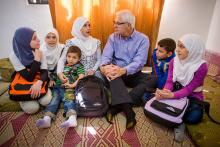
Rejecting fearmongering about the resettlement of Syrian refugees in the U.S., about 100 evangelical leaders are calling on Christians and their churches “to support ministries showing the love of Jesus to the most vulnerable, those in desperate need, and the hurting.”
“Our statement is to change a narrative of fear and instead focus on faith and compassion,” said Ed Stetzer, executive director of LifeWay Research in Nashville, Tenn. “Our desire is not to resettle everybody in another country. When a house is burning down, we need to put out the fire and rescue people fleeing the fire.”